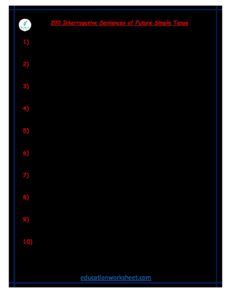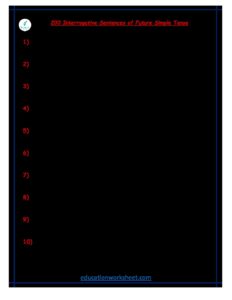Future Simple Tense interrogative examples
Future Simple Tense interrogative examples

1. Forming the Future Simple Tense in Interrogative Sentences:
The structure of the Future Simple Tense in interrogative sentences is as follows:
Will + Subject + Base Form of the Verb + Rest of the Sentence?
- “Will” is the auxiliary verb that indicates the future.
- The subject of the sentence typically comes next.
- Then, the base form of the main verb is used.
- Finally, the rest of the sentence is formed to create the question.
2. Usage of the Future Simple Tense in Interrogative Sentences:
The Future Simple Tense in interrogative sentences is commonly used to:
- Ask about future plans or intentions.
- Seek information about future events or actions.
- Make offers or suggestions about future actions.
3. Examples of the Future Simple Tense in Interrogative Sentences:
Here are various examples to illustrate how the Future Simple Tense is used in interrogative sentences:
- Will you come to the party tonight?
- This question asks about the person’s intention to attend a party in the future.
- Where will they go on vacation next summer?
- This question inquires about their future travel plans.
- Will she buy a new car or keep her old one?
- This question seeks information about her future decision regarding a car purchase.
- What time will the concert start tomorrow?
- This question asks about the starting time of a concert in the future.
- Will you help me with my homework later today?
- This question is a request for assistance with a future task.
- Who will be the guest speaker at the conference next week?
- This question seeks information about a future event.
- Will he finish his project by the deadline?
- This question asks about the completion of a project in the future.
- Will it rain tomorrow?
- This question inquires about the weather forecast for the next day.
- Will you marry me in the future?
- This question asks about someone’s intentions regarding marriage.
- How will they celebrate their anniversary next year?
- This question seeks information about their future anniversary celebration plans.
4. Additional Notes on the Future Simple Tense:
- The Future Simple Tense can also be used with “shall” instead of “will” in some cases, especially in British English. For example, “Shall we go to the movies tonight?”
- To create negative sentences in the Future Simple Tense, you can add “not” after “will.” For example, “Will not” becomes “won’t.” Example: “Won’t you join us for dinner?”
- When forming questions in the Future Simple Tense, it’s essential to place the auxiliary verb “will” before the subject. For example, “Will they visit us next weekend?”
- When asking questions in the Future Simple Tense, question words such as “what,” “where,” “when,” “why,” “how,” and “who” can be used to seek specific information. For example, “How will you get to the airport?”
5. Future Simple Tense in Everyday Conversations:

The Future Simple Tense is frequently used in everyday conversations to inquire about future plans, make invitations, and discuss future events. Here are some common situations in which you might encounter this tense in interrogative sentences:
- Making plans with friends: “Will you come to the movie with us on Saturday?”
- Discussing future travel: “Where will you go for your next vacation?”
- Organizing events: “What time will the party start on Friday?”
- Asking about future intentions: “Will you apply for that job?”
- Offering assistance: “Will you help me move next weekend?”
- Planning for future celebrations: “How will you celebrate your birthday this year?”
- Confirming arrangements: “Will you pick me up from the airport tomorrow?”
- Discussing weather forecasts: “Will it be sunny this weekend?”
6. Common Mistakes to Avoid:
When using the Future Simple Tense in interrogative sentences, it’s important to be mindful of a few common mistakes:
- Incorrect placement of “will”: The auxiliary verb “will” should always come before the subject. For example, it should be “Will you come?” and not “You will come?”
- Not using the base form of the verb: In the Future Simple Tense, the base form of the verb (e.g., “come,” “go,” “eat”) should be used. Avoid using the infinitive form (e.g., “to come,” “to go”) in interrogative sentences.
- Failure to use question words: When seeking specific information, remember to use question words like “what,” “where,” “when,” “why,” “how,” and “who” at the beginning of your question.
7. Summary:
The Future Simple Tense in interrogative sentences is a valuable tool for discussing and inquiring about future actions, events, and intentions. By using the auxiliary verb “will” and following the appropriate structure, you can effectively ask questions about the future. Whether making plans, discussing future travel, or seeking information, the Future Simple Tense is a versatile and essential part of English grammar for engaging in meaningful conversations about the future.

